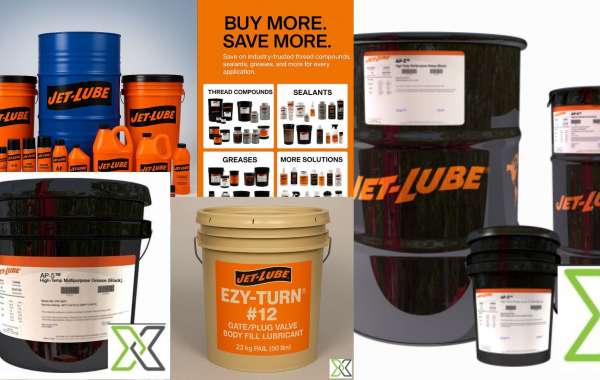In industries like oil & gas, petrochemical, marine, and power generation, valve performance is critical to operational efficiency and safety. A small leak or a stuck valve can lead to costly downtime and potential hazards. This is where gate valve sealants and high-performance lubricants play a vital role. These specialized compounds are engineered to provide superior sealing, reduce wear and tear, and ensure smooth operation under extreme pressures and temperatures.
This article explores gate valve sealants, plug valve lubricants, and advanced products like Jet Lube 550 Extreme, offering a complete overview of their applications, benefits, and best practices.
Understanding Gate Valve Sealants
Gate valve sealants are specialized compounds formulated to prevent leakage and ensure a tight seal in gate valves. They are used in critical operations where valves control the flow of liquids, gases, or slurries.
Key functions include:
- Leak Prevention – Forms a tight, durable seal that withstands high pressure.
- Corrosion Resistance – Protects internal valve surfaces from rust and chemical damage.
- Lubrication – Ensures smooth opening and closing, reducing wear.
- Temperature Tolerance – Maintains performance in extreme hot or cold environments.
Modern sealants are designed to work even in damaged or worn seats, creating a reliable barrier that restores operational integrity without requiring immediate repairs.
Importance in Industrial Operations
Gate valves are widely used in industries where safety, efficiency, and reliability are non-negotiable. Any leakage or malfunction can cause production delays, environmental hazards, and safety concerns.
A high-quality gate valve sealant helps:
- Reduce maintenance downtime
- Extend valve lifespan
- Minimize costly shutdowns
- Improve operational safety
For offshore drilling platforms, chemical processing plants, and refineries, using the right sealant can make the difference between smooth operations and unplanned shutdowns.
Plug Valve Lubricants
While gate valves are common, plug valves also require specialized care. Plug valve lubricants serve two primary purposes—providing a protective film and sealing capability.
These lubricants:
- Reduce operating torque, making valve operation easier.
- Protect against corrosion from water, chemicals, and salt air.
- Prevent sticking or seizure caused by long periods of inactivity.
- Improve sealing performance in high-pressure and high-temperature applications.
When used correctly, plug valve lubricants can restore leaking valves without removing them from service, saving time and operational costs.
Jet Lube 550 Extreme: Heavy-Duty Thread Compound
One of the industry’s top-performing products is Jet Lube 550 Extreme. This high-performance thread compound is specifically designed for extreme pressure, temperature, and corrosive environments.
Key features:
- Withstands temperatures from -65°F to 1200°F (-54°C to 649°C).
- Protects against galling, seizing, and corrosion.
- Formulated for a wide range of applications, including drilling, production, and marine use.
- Compatible with ferrous and non-ferrous metals.
Its advanced formulation ensures threads remain operational even under severe stress, making it an essential tool for maintenance teams in heavy industries.
Gate Valve Lubricants: Smooth Operation Every Time
A gate valve lubricant works alongside a sealant to ensure the internal components remain free-moving and protected from wear. Without proper lubrication, gate valves can seize, leading to operational delays or safety risks.
Benefits of gate valve lubricants include:
- Lower operating torque
- Reduced wear and tear
- Extended service life
- Enhanced sealing effectiveness when used with a sealant
Choosing a lubricant that is chemically compatible with the process media is critical to ensuring maximum performance.
Best Practices for Application
To get the most out of sealants and lubricants, correct application is crucial.
Step-by-step tips:
- Clean the Valve – Remove old sealant, dirt, and debris to ensure proper bonding.
- Choose the Right Product – Select a sealant or lubricant formulated for your operating pressure, temperature, and media type.
- Use Proper Tools – Apply using high-pressure lubrication equipment for deep penetration.
- Apply Regularly – Schedule preventive maintenance rather than waiting for failure.
- Monitor Valve Performance – Look for early signs of leakage or stiffness and address them immediately.
Industries That Rely on Valve Sealants
These products are indispensable in:
- Oil & Gas – Offshore rigs, refineries, and pipelines
- Petrochemicals – Chemical manufacturing plants
- Marine – Ships, ports, and offshore platforms
- Power Generation – Thermal and nuclear plants
- Mining – Slurry and abrasive media handling
Why Quality Matters
Not all valve sealants and lubricants are created equal. Using substandard products can result in:
- Premature valve failure
- Corrosion and metal degradation
- Increased operating torque
- Higher maintenance costs
High-grade products ensure optimal performance, reduce maintenance frequency, and enhance safety.
Conclusion
Whether you are maintaining a gate valve, plug valve, or threaded connections, the right sealant or lubricant can significantly extend equipment life, improve efficiency, and prevent costly downtime. From gate valve sealants that provide unmatched sealing capability to Jet Lube 550 Extreme for extreme conditions, choosing the right industrial lubricant is essential for smooth, reliable operations.







